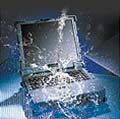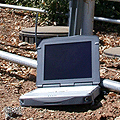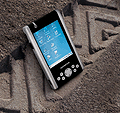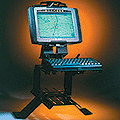|
Advantech UTC-520
Intel Atom D510-based "Ubiquitous Touch Computer" for interactive self-service applications
(by Conrad H. Blickenstorfer)
The Advantech UTC-520 is a specialized all-in-one panel computer with a 21.5-inch wide-format touch screen. It is, however, not a competitor to consumer all-in-one systems such as the Apple iMac computers. Instead, the UTC-520 is designed to allow easy integration of key peripherals and its intended use is as display systems for diversified self-service and promotional applications in different areas such as self-ordering, virtual receptionist, intranet access, trade shows, retail, etc.
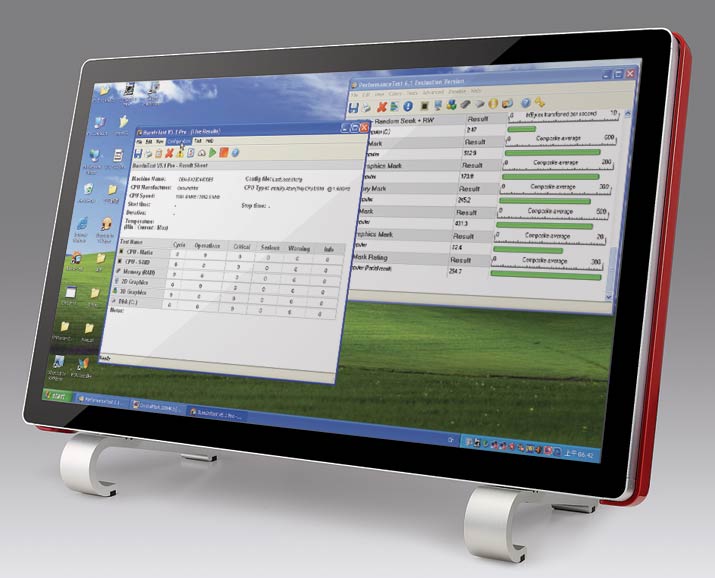
A closer look at the Advantech UTC-520
In terms of design and technology, the UTC-520 differs from generic industrial panels in its elegant, slim design, flush-mount wide-format display, and ability to be used stand-alone and not just mounted into panels. The display measures 21.5 inches diagonally with a 16:9 aspect ratio default resolution of 1366 x 768 pixel, which means it is well-suited for 720p HD video. The UTC-520 comes standard with a resistive 5-wire touch screen. A multi-touch digitizer is optionally available. There is no fan and the unit operates silently and without heating up at all.
The whole device measures 20.3 x 12.3 inches and is just 1.6 inches thick. Weight is 13.2 pounds. The package comes with two machined aluminum feet for standalone use. The mechanical design also has the cut-outs, indents and screwholes required for mounting on numerous OCTANORM exhibition systems products as well as on standard 100 x 100 mm VESA mounts.
Despite its slender design, there's plenty of room inside. The UTC-520 is heavily modularized, with a small and very compact system board at the center and a variety of subsidiary boards handling additional functionality—very much an embedded systems approach. Below you can see what the UTC-520 looks like inside once its steel backplate is removed.
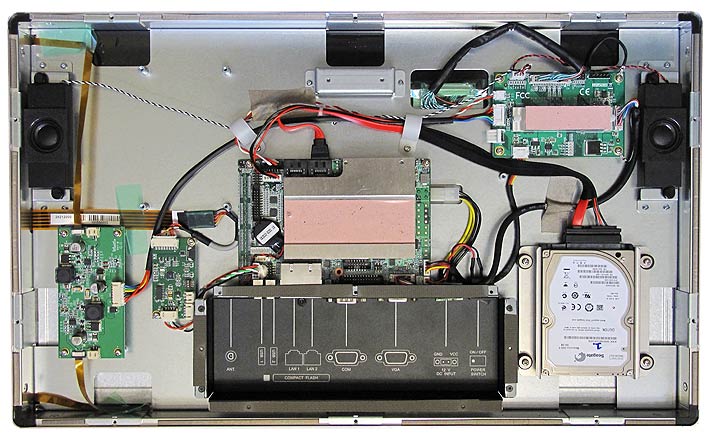
Not visible in the picture is the unit's CF Card slot that can be used to accommodate a solid state disk instead of, or in addition to the hard disk. Also not visible is the mini-PCIe slot that's meant to be used for an optional WiFi module. Both are on the bottom side of the small system board where you also find the sole 200-pin SO-DIMM DDR2 667 memory slot. The 2.5-inch hard disk sits in a rubber-mounted caddy. Our review unit came with a 160GB Seagate Momentus spinning at 5,400 rpm. Note the two small rearward facing 3-watt speakers and the heat spreader on the system board.
All connectors and controls are concentrated in a single recessed downward-facing I/O block. You get two USB ports, a DB9 serial port, a VGA video port, two RJ34 LAN jacks, the power switch, and the power plug.
Dual-core Atom power
The Advantech UTC-520 is one of the first products we've seen using Intel's dual-core Atom D510 processor. This chip was introduced in December of 2009 as an economical solution for low-end desktop computers. At that time, Intel also introduced the companion NM10 I/O controller to go with the new Atom N450, D410 and D510 Atom chips, but Advantech's specs suggest that the UTC-520 uses the ICH8M mobile I/O controller instead. Anyway, the Atom D510 has a TDP (thermal design power) rating of 13 watts, which is a lot more than the two watts the N270/N450/Z5xx Atom chips draw. Since the UTC-520 will always be plugged in (there is no internal battery), the higher (albeit still very low) power draw makes no difference, especially since the unit's heavy metal housing serves as a very effective heat sink.
What is of interest is how well the Atom D510 performs. To find out, we ran two separate sets of performance benchmarks (Passmark and CrystalMark), and compared the results with those of a variety of other Advantech boards and systems we had bencharked earlier. The results are as follows:
|
PERFORMANCE COMPARISON PASSMARK
|
UTC-520
|
PIT-1501W
|
PPC-157T
|
ARK-3399
|
ARK-DS303
|
SOM-6760
|
|
Intel Processor
|
Atom D510
|
Atom Z530
|
Core 2 Duo T7400
|
Core Duo L2400
|
Atom N270
|
Atom Z530
|
|
Product type
|
Touch terminal
|
Touch terminal
|
Panel PC
|
Industrial PC
|
Digital Signage
|
COM-Micro
|
|
Clock speed
|
1.66GHz
|
1.6GHz
|
2.16GHz
|
1.4GHz0
|
1.6GHz
|
1.6GHz
|
|
Thermal Design Power (TDP)
|
13.0 watts
|
2.3 watts
|
34.0 watts
|
15.0 watts
|
2.5 watts
|
2.3 watts
|
|
CPU Mark
|
512.9
|
244.4
|
1292.1
|
847.5
|
252.6
|
315.6
|
|
2D Graphics Mark
|
173.8
|
108.3
|
285.8
|
145.0
|
158.7
|
207.2
|
|
Memory Mark
|
245.2
|
215.3
|
552.3
|
264.9
|
227.7
|
191.6
|
|
Disk Mark
|
431.3
|
162.1
|
459.6
|
10.1
|
459.4
|
70.7
|
|
3D Graphics Mark
|
12.4
|
18.3
|
37.8
|
29.5
|
77.3
|
19.6
|
|
Overall PassMark
|
294.7
|
154.5
|
584.7
|
302.4
|
232.6
|
137.3
|
PERFORMANCE COMPARISON
CRYSTALMARK 2004R3
|
UTC-520
|
PIT-1501W
|
PPC-157T
|
ARK-3399
|
ARK-DS303
|
SOM-6761
|
|
ALU
|
11309
|
5323
|
19311
|
12971
|
5409
|
5376
|
|
FPU
|
9347
|
4678
|
22560
|
15353
|
4671
|
4667
|
|
MEM
|
7778
|
3853
|
10867
|
6407
|
4223
|
3667
|
|
HDD
|
7087
|
5058
|
8231
|
3631
|
8221
|
2702
|
|
GDI
|
2270
|
2321
|
4679
|
2403
|
2158
|
2427
|
|
D2D
|
3693
|
859
|
3015
|
2444
|
2230
|
1009
|
|
OGL
|
711
|
317
|
2272
|
825
|
684
|
505
|
|
Overall CrystalMark
|
42195
|
22409
|
70935
|
44034
|
27596
|
20353
|
The results are quite impressive. The D510 produced far better numbers than systems based on the popular Atom N270/280 (used in tens of millions of netbooks) or the Atom Z530 (quite popular in embedded and industrial systems). The D510-powered UTC-520 even came very close to the performance figures of one of Advantech's Core 2 Duo industrial PCs. It's no match for a standard voltage Core 2 Duo such as the T7400, but that's to be expected given that chips higher clock speed and TDP.
Note that benchmarks are notoriously confusing when used to compare different processor platforms. However, in our experience, the overall bottomline is usually a good predictor of real world performance. That is no different here: the D510-powered Advantech UTC-520 feels quick and responsive and should have no problems handling the interactive media terminal functions it is designed for.
The display
In an interactive media terminal, display quality is very important, and the Advantech UTC-520's 21.5-inch LCD is up to the task. Its strong 400 nits LED backlight (your average notebook computer has about 200 nits) makes the display crisp and bright. The very wide 170 degree horizontal viewing angle means you can look at the screen from extreme angles and still see it clearly. The vertical viewing angle is also very wide (160 degrees), but there are some color shifts when you look at the screen from extreme vertical angles. Since the UTC-520 will usually be mounted in a position conducive for easy viewing, the vertical color shift does not impact performance.
The LCD is recessed behind a protective front cover that extends flush across the entire surface. There is a black bezel around the LCD similar to that of an iMac. The surface is glossy, which can result in annoying reflections. It is some, but not very, prone to finger prints. Overall, though, this is an excellent display. Below are some of the applications Advantech envisions:

Ruggedness
While the UTC-520 is designed for stationary deployment in indoor environments, Advantech does submit some ruggedness specs. The unit can handle operating temperatures from 32 to 104 degrees, which is well beyond the range encountered in most self-service applications. It's also designed to handle a degree of vibration and shock, and the front panel offers IP54 protection, so if the device were to be mounted in a waterproof panel (the backside has cutouts and is not sealed against water), it can handle dust and rain.
The Advantech UTC-520
The UTC-520 represents the start of series of human-oriented, all-in-one, interactive digital signage stations for Advantech. According to the company, future plans include a smaller 15-inch system and there's a roadmap ranging from interactive signage systems with few peripheral needs on one end, to market specific, self-service kiosk systems with multi-peripheral integration on the other end. Considering that in just the last two or three years, almost all airports and many other public places have replaced their ancient manual or mechanical information boards with digital signage and info terminals, the market for this technology seems very promising indeed.
Advantech UTC-520 Specs:
| Added |
October 2010
|
| Type |
Touch computer/panel
|
| CPU Type |
Dual-core Intel Atom D510 with 2 x 512kb L2 cache
|
| Clock Speed |
1.66GHz
|
| Chipset |
Intel ICH8M
|
| BIOS |
AMI
|
| OS |
Windows XP/XPE, Windows 7. Embedded Standard 7
|
| Memory |
DDR2 667MHz in 1 200-pin SODIMM socket
|
| Graphics Controller |
unknown
|
| VRAM |
unknown
|
| Expansion slots |
1 CF Card, 1 mini-PCIe
|
| Display |
21.5-inch TFT LCD with LED backlight, 170/160 degree viewing angle, 400 nits
|
| Resolution |
Default: 1366 x 768 pixel; scalar board allows resolution up to full 1080p HD (1920 x 1080)
|
| Digitizer |
Analog resistive 5-wire with USB interface
|
| LAN |
2 x 10/100/1000Base-T |
| SATA |
1 x 300 MB/s |
| Disk |
160GB 5400rpm Seagate Momentus
|
| SSD |
Optional SSD in CF Card slot
|
| USB |
2 x USB 2.0
|
| Serial |
1 x RS232 |
| Audio |
2 x 3 watts |
| Size |
20.3 x 12.3 x 1.6 inches
|
| Weight |
13.2 lbs.
|
| Operating Temp. |
32 to 104F
|
| Sealing |
IP54 front panel protection
|
| Price |
inquire
|
| Datasheet |
Advantech UTC-520 |
Advantech Corporation
38 Tesla, Suite 100
Irvine, CA 92618
Toll Free: 1-800-866-6008
Ph: 949-789-7178
Fax: 949-789-7179
ECGInfo@advantech.com
www.advantech.com
Advantech Co. Ltd.
No.1, Alley 20, Lane 26, Rueiguang Road
Neihu District, Taipei Taiwan 114, R.O.C.
Tel: 886-2-2792-7818
Fax: 886-2-2794-7301
www.advantech.com
|

